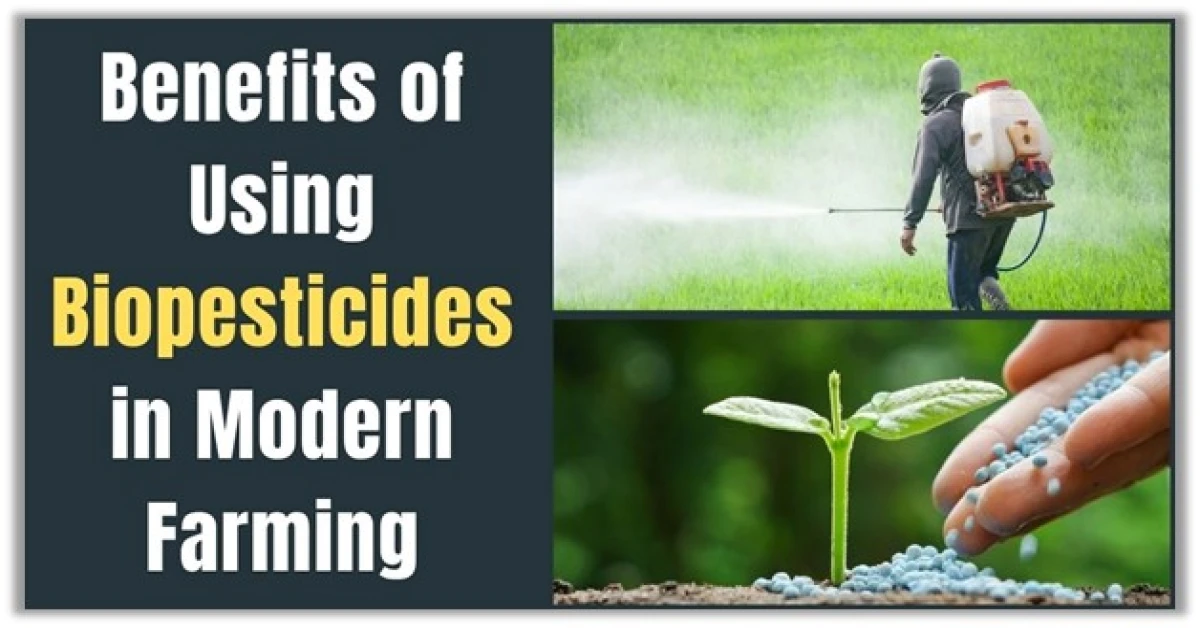
Introduction to Modern Farming:
Modern farming mainly involves use of advanced technologies such as GPS-guided tractors, drones, sensors, robotics, and AI as well as practices, and techniques to increase effectiveness, productivity, and sustainability in agricultural during framing. This uses advanced machinery and technologies precision farming, and biotechnology tools and data analytics to monitor soil and crop health. Modern farming techniques use bio-based products including biopesticides, biofertilizers as well as hydroponics and vertical farming techniques to enhance productivity and improve crop, soil health.
Biopesticides Types Used in Modern Farming:
|
Type of Biopesticides |
Description |
Key Example / Function |
|
Microbial Biopesticides |
Most widely used; involve microorganisms like fungi, bacteria, viruses, or protozoa that are transformed to target specific pests and plant diseases. |
Bacillus thuringiensis (Bt), which toxic to insect larvae but safe for humans, animals, and beneficial insects. |
|
Biochemical Pesticides |
Made from naturally occurring compounds that control pests through non-toxic mechanism. |
Includes plant hormones, enzymes, and essential oils like pheromones that disrupt pest mating or feeding. |
|
Botanical / Plant-Based |
Derived from plant extracts; they are eco-friendly and pose minimal risk to non-target organisms. |
Neem oil, pyrethrum, that affect pests at various life stages without harming beneficial organisms. |
Benefits of Using Biopesticides in Modern Farming:
The biopesticide market is mainly characterized by reduction of chemical residues in farming practices and global pressure to meet standards for organic and eco-friendly framing. Biopesticides are continuously used in modern farming to enhance safety, minimize human toxicity, and meet regulatory ethics for pesticide restrictions, is anticipated to drive biopesticide market growth. Pristine Market Insights highlights the role of biopesticides in improving soil health, promoting biodiversity, and supporting integrated pest management (IPM) strategies. Technological innovations, such as precision application tools and advanced formulation are aim to enhance field performance and reduce input costs. The benefits of biopesticides in modern farming is as follows:
- Target-specific Action to Control Harm: Target specificity is one of the key returns of biopesticides, that specifically designed to disturb type of pests or pathogens without harming other organisms. Traditional synthetic pesticides may target large-scale insects and organisms, including also beneficial ones such as pollinators, natural predators, and soil microorganisms. To overcome this challenges biopesticides are altered to target only pests that cause damage to crops, making them crucial component of agriculture.
- Achieves Environmental Sustainability Goals: Biopesticides breaks down natural sources harmlessly in the environments, which could not contaminate soil, water or air. This rapid biodegradation aims to prevent long-term pollution and protects surrounding ecosystem, which is essential for long-term sustainability of farming system in biopesticide market. As they originate from bacteria, fungi, and minerals, making them significant alternative to synthetic chemicals.
- Provide Support for Organic Farming: Biopesticides supports organic farming that provides environmentally safe pest management solutions that obey organic certification standards. Organic farming limits the synthetic chemicals usage because of their destructive effect on soil health, biodiversity, and food safety. However, biopesticide offer consistent method to control; pests and diseases to meet organic agricultural standards including soil fertility and minimizing chemical inputs. As growing consumer demand for organic food products, biopesticides helps to organic farmers to meet these market opportunities by ensuring sustainable practices.
- Reduces Risk of Resistance Development: The development of resistance by pests to chemical pesticides is one of the most significant challenges in farming practices, which can lead to decrease in effectiveness and need for higher doses or new chemicals. However, biopesticides help to reduce risk of resistance by unique and complex modes of action. Modern farming also relies on biotechnology practices to modify specific natural source of biopesticide to target and attack through multiple mechanisms. Moreover, this includes production of enzymes, toxins or intrusive pest behaviour, which makes it harder for pests to adapt and develop resistance.
- Improves Soil Health: Biopesticides play crucial role improving soil health which contributes to long-term farming sustainability. Traditional synthetic pesticides can harm soil organism and degrade soil quality, but biopesticides focused to enhance soil ecosystem. Microbial-based biopesticides such as Bacillus, Trichoderma, or Pseudomonas species are aim to control pests and pathogens as well as improve soil health by decomposing organic matter.
- Incorporation with Integrated Pest Management (IPM): IPM is an agricultural approach that combines biological, cultural, physical, and chemical methods to manage pests and pathogen, making them critical tool in supportable and science-based pest control. However, biopesticides derived from natural sources they can be easily incorporated into various stages of an IPM cycle. Botanical biopesticides or pheromone-based products used for monitoring, repelling, or disrupting pest mating cycles, which are essential components of IPM.
- Regulatory Support: Regulatory support across global countries and increasing benefits of biopesticides for human safety, non-target organism, and the environment, the global regulatory bodies such as the United States Environmental Protection Agency (EPA), the European Food Safety Authority (EFSA), and other Asian regulation established for evaluating and approving pathways for biopesticides products. Additionally, government initiatives, subsidies, and policies are aim to promote sustainable agriculture and accelerate the development & integration of biopesticide into commercial farming systems.
- Encourages Biodiversity: Encourage and protect biodiversity is most impact advantage of biopesticides in modern farming, which are designed to act specifically against targeted pests or pathogens. It helps to preserve natural predators’ populations like ladybugs, lacewings, and parasitic wasps, and decomposers like earthworms and beneficial fungi, this can improve ecosystem services which are essential for sustainable farming. However, biopesticides ensures minimal environmental disturbance and supporting habits like forests, wetlands, and buffer zones, this can create farming environment where diverse species can coexist.
- Enhancement in Crop Yields and Quality: Enhancement in Crop Yields and Quality: Many microbial-based and biochemical based biopesticides are aim to stimulate plant growth, strengthen root systems, and improve nutrient uptake. Biopesticides contributes to more stable growing environment, this can lead to stronger, and more vigorous plants that produce higher crop product. In the context of, in March 2025, Peptech Biosciences Ltd., acquired technology from National Bureau of Agricultural Insect Resources (NBAIR), India to improve crop productivity by minimizing environmental impact. This technology used toxic strains of Bacillus thuringiensis (Bt), a microbial biopesticide that focused to attack pests which affects pulses, vegetables, and oilseeds.
- Safer for Human and Animal Health: Biopesticides is significantly safer to human and animal health represent significant advantage for biopesticides market. As they are derived from natural sources and have low toxicity, which pose negligible risk to humans, livestock, and wildlife. Biopesticides can more beneficial for farmers and agricultural workers which reduces the risk of chemical exposure through inhalation, skin content, and accidental ingestion. Additionally, their natural configuration and selective action also pose minimal risk to native animals and wildlife like birds, amphibians, pollinators, and aquatic species, which directly promotes to healthier modern farming.
Conclusion:
Biopesticides offer large scale of advantages in modern farming and play crucial role in improving soil health, enhancing crop yields & quality and supports to biodiversity as compared to synthetic pesticides. Stricter environmental regulations, consumer awareness, and shift towards supportable food production, is anticipated to drive biopesticides market growth.



